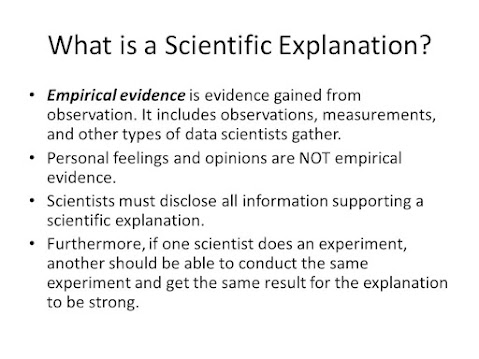EVERYTHING IS THEORETICALLY IMPOSSIBLE, UNTIL IT IS DONE.
Thousands of years ago, our explanations about how the world worked were not very good. Things we couldn't understand were attributed to praise or vengeance from gods, or thinking the world was random. Thanks to science, we have a much better idea about why things are the way they are. By this article I would like to present about simple discussion about scientific explanation and examples.
Science is about empirical knowledge. Philosophy is also about a priori knowledge. Science is about descriptive facts, philosophy is also about normative truths. Science is about physical objects, philosophy is also about abstract objects. Science always depends on observations but we can see the science through philosophy, we build questions, find evidences and become to decisions.
In short Science is about empirical knowledge; philosophy is also about a priori knowledge.
Scientific explanation is a reason for something on the principles of science. Most time scientific explanation uses observations and measurements to explain something people see in the natural world. A scientific explanation is a way of explaining something we see in the natural world that's based on observations and measurements. We evaluate scientific explanations by comparing it to the current evidence and looking at what predictions it makes about the world.
A scientific explanation is a way of explaining something we see in the natural world that's based on observations and measurements.
EXPLANATION AND CONFIRMATION?
Explanation is a statement or account that makes something clear.
A statement made to clarify something and make it understandable.
Conformation is the shape or structure of something, especially an animal. Confirmation is verification or final proof of something. Confirmation involves providing reasons to believe that (or evidence that) certain claims (specifically, scientific theories) are true an explanation is that which is being explained, and the explanting of an explanation is that which does the explaining. Confirmation Involves providing reasons to believe that certain claims (specifically, scientific theories) are true. Explanation involves answering questions like “Why (or how) is it the case that X?, where “X” is assumed to be true (in the context C in which the question is asked). Mainly explanation involves answering questions, but confirmation involves providing reasons to believe that certain claims. In contemporary philosophy, confirmation theory can be roughly described as the area where efforts have been made to take up the challenge of defining plausible models of non-deductive reasoning.
SCIENTIFIC EXPLANATION EXAMPLES
We have good, scientific explanations for most of what we see in the natural world. For example, why do objects fall to the ground? Well, there is a force called gravity that attracts every object in the universe to every other object.
The scientific theory says that bigger objects produce larger forces of gravity, and that the closer two objects are together the larger the force of gravity. The earth's gravity is really easy to observe because the earth is huge, and it's nearby.
Another example of a scientific explanation is the answer to the common question, 'Why is the sky blue?' It's all about light scattering. We receive white light from the sun, and that light fills the earth's atmosphere. Most of the light that passes overhead keeps going and doesn't reach our eyes at all. But some of it is scattered by the air molecules and bounces into our eyes. Blue light scatters more than any other color, so the sky appears blue to us.
Both of these are scientific explanations because they use all the observations and data we humans have collected. But, let's talk about how we evaluate scientific explanations - how we figure out whether a scientific explanation is a good one or not.
Science is the study of the natural world through observation and experiment. A scientific explanation uses observations and measurements to explain something we see in the natural world. Scientific explanations should match the evidence and be logical, or they should at least match as much of the evidence as possible.
Dinesh Shiwantha Wanigathunga
dineshshiwantha@gmail.com








No comments:
Post a Comment